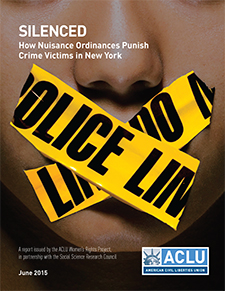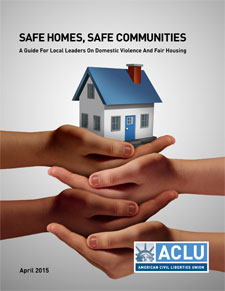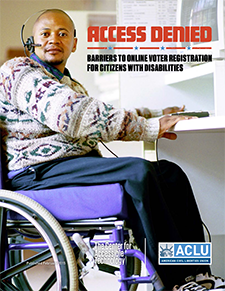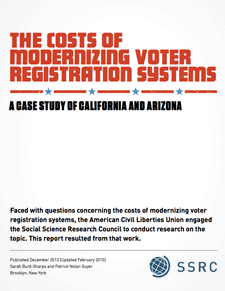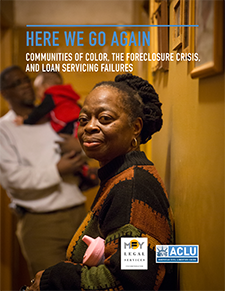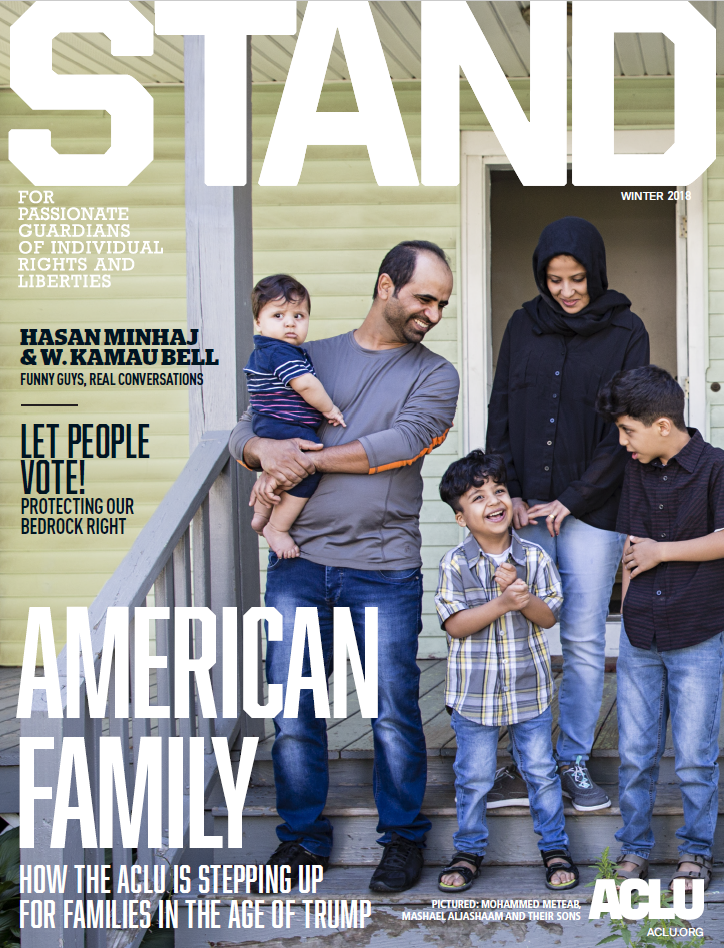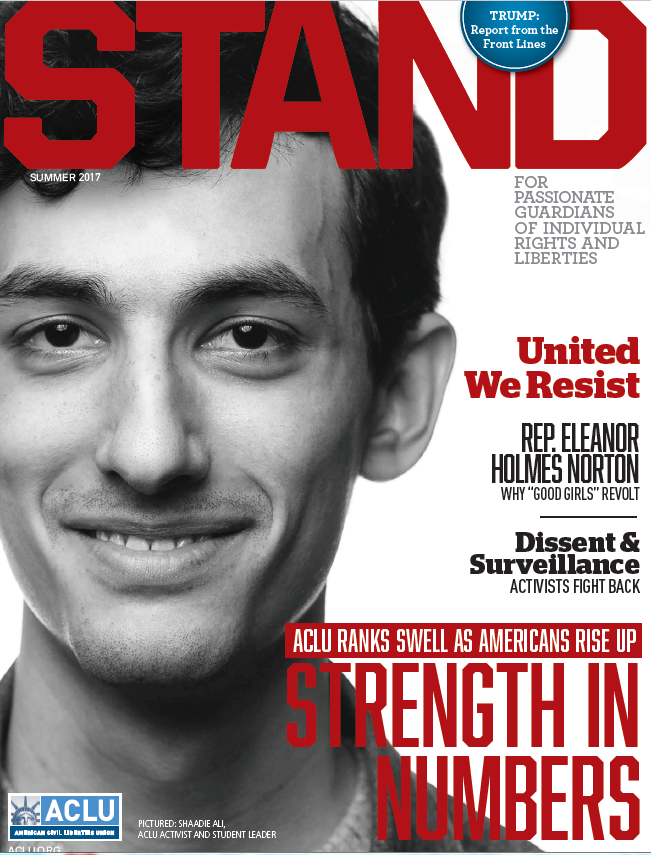Research & Publications
Access in-depth resources and analysis published by the ACLU regarding our most pressing civil liberties issues.
All Publications
Search will open in a new tab using DuckDuckGo
SILENCED: How Nuisance Ordinances Punish Crime Victims in New York
Housing security and access to effective emergency and police assistance are fundamental elements of creating safe and vibrant communities. For victims of domestic violence, housing and police access can take on even more importance, as they are often integral to escaping lifethreatening violence and living free from abuse. However, municipalities across the country are increasingly enacting laws that penalize tenants and property owners based on police response or criminal activity occurring on a property. These laws – typically called nuisance ordinances, crime free ordinances, or disorderly house laws – deter crime victims from reporting crime and frequently lead to evictions or other harmful penalties for victims who do call 911 in an emergency.
Safe Homes, Safe Communities
One in three women experiences domestic violence in her lifetime, resulting in physical injury, economic distress, psychological trauma, and even death. Domestic violence is a nationwide crisis that wreaks havoc on the lives of victims and their families, and has far-reaching consequences for entire communities. One such consequence is that survivors are at heightened risk for homelessness and housing insecurity, due to factors including discrimination, loss of employment, economic abuse leading to poor credit history, and survivor’s need to be in a home that is secure from their abuser. This guide recommends best practices for local leaders to promote fair housing for DV survivors in their communities.
This guide is written for municipal, county, and state leaders who influence the policies of their communities with respect to housing, emergency shelter, policing, and social services. Advocates can also use this guide to strengthen how their community addresses the housing needs of survivors.
The guide covers the following topics:
- Information about the federal and state laws affecting housing for domestic violence survivors
- Best practices for promoting fair housing for domestic violence survivors, including information on how to:
- Incorporate domestic violence considerations into local housing planning;
- Protect domestic violence victims’ access to effective police assistance;
- Protect domestic violence survivors’ rights in rented or owned homes;
- Collaborate with and support the efforts of domestic violence service providers; and
- Protect public housing and Section 8 housing tenants.
By vigilantly safeguarding the housing rights of domestic violence survivors, municipalities can protect not only the survivors, but entire communities from the disastrous consequences of DV and housing insecurity.
Appendix
In addition to the Safe Homes, Safe Communities guide, the following are useful resources for local leaders to learn more about domestic violence and fair housing, their obligations, and affirmative ways to protect domestic violence survivors.
- State Laws
- Nat’l Hous. Law Project, Hous. Rts of Domestic Violence Survivors: A State and Local Law Compendium (2014)
- Residential Tenant’s Right to Seek Police and Emergency Assistance Law, Minn. Stat. § 504B.205 (2014)
- Protection for victims of abuse or crime, 53 Pa. Cons. Stat. Ann. § 304 (2014)
- Municipal Laws
- Monroe County Code §§ 260-1 & 260-2
- Westchester County Code §§ 700.02, 700.05, & 700.21
- S.F., Cal., Admin. Code ch. 37, § 9
- Federal Guidance and Information on Federal Requirements
- The Violence Against Women Reauthorization Act of 2013: Overview of Applicability to HUD Programs, 78 Fed. Reg. 47717 (Aug. 6, 2013)
- Violence Against Women Reauthorization Act of 2013: Implementation in HUD Housing Programs, Docket No. FR-5720-P-02 (proposed March 25, 2015) (to be codified at 24 CFR pts. 5, 92, 200, 574, 576, 578, 880, 882, 883, 884, 886, 891, 960, 966, 982-83)
- Affirmatively Furthering Fair Housing Proposed Rule, 78 Fed. Reg. 43,710, 43,712 (proposed July 19, 2013) (to be codified at 24 CFR pts. 5, 91, 92, 570, 574, 576, and 903)
- U. S. Interagency Council on Homelessness, PHA Programs and Policies Working to Prevent Homelessness Protecting Victims of Domestic Violence PHA Domestic Violence Guide
- Karlo Ng, Rural Development Issues Notice on VAWA Implementation, 44 Housing Law Bulletin 69 (2014)
- Gideon Anders & Karlo Ng, VAWA 2013 Implementation Updates, 44 Housing Law Bulletin 154 (2014)
- Karlo Ng, Rural Development Issues Revised VAWA Implementation Notice, 45 Housing Law Bulletin 38 (2015)
- Information on Briggs v. Norristown
- Reports
- Matthew Desmond & Nicol Valdez, Unpolicing the Urban Poor: Consequences of Third-Party Policing for Inner-City Women, 78 Am. Sociological Rev. 117 (2013)
- Emily Werth, Sargent Shriver Nat’l Ctr. On Poverty Law, The Cost of Being Crime Free: Legal and Free Rental Housing and Nuisance Property Ordinances 5-20 (Aug. 2013)
Access Denied: Barriers to Online Voter Registration for Citizens with Disabilities
Published by the ACLU and the Center for Accessible Technology, this report focuses on one urgent issue: the accessibility of online voter registration websites for voters with disabilities.
The Costs of Modernizing Voter Registration Systems: A Case Study of California and Arizona
This report by the Social Science Research Council commissioned by the ACLU found that making online voter registration accessible for Americans with disabilities can save millions of taxpayer dollars.
Here We Go Again: Communities of Color, the Foreclosure Crisis, and Loan Servicing Failures
During the subprime lending boom of the early 2000s, communities of color were targeted for the riskiest, most predatory mortgages. Since the housing bubble burst in 2008, homeowners in these communities have disproportionately struggled with default and foreclosure. These are the communities that most desperately need solutions to the foreclosure crisis. Instead, new data obtained from the Consumer Financial Protection Bureau (“CFPB”) by MFY Legal Services, Inc (“MFY”) and the American Civil Liberties Union (“ACLU”) supports the conclusion that loan modification programs are failing homeowners in communities of color.
This report’s analysis of CFPB mortgage complaint data reveals a pattern: complaints about harmful servicer misconduct, the kind that places homeowners at risk of losing their homes, make up a larger share of complaints from communities of color than from predominately white communities.
We recommend concrete steps that federal, state, and local authorities must take to expose, address, and ultimately correct disparities in the way mortgage relief is reaching communities of color. These actions are crucial to ensure that communities of color are not, once again, bearing the brunt of systemic failures.
View the CFPB data here (.xls).
ACLU Magazine
Published twice a year, ACLU Magazine shares updates on the ACLU’s critical litigation and advocacy work across the country and tells the stories of the activists, attorneys, and clients at the heart of each case and campaign. To receive ACLU Magazine by mail, become a monthly donor today.
Stay Informed
Sign up to be the first to hear about how to take action.

